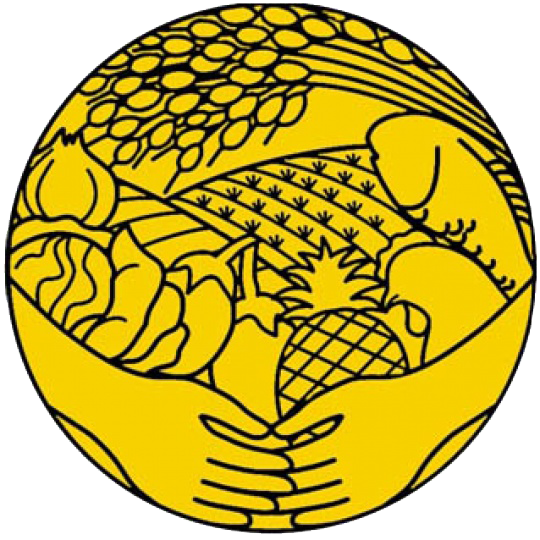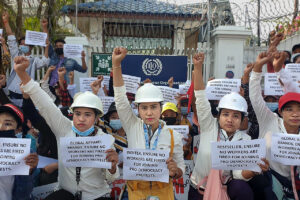Peoples Coalition on Food Sovereignty (PCFS) Statement
15 December 2015
[[{“type”:”media”,”view_mode”:”media_large”,”fid”:”1267″,”attributes”:{“alt”:””,”class”:”media-image”,”height”:”130″,”typeof”:”foaf:Image”,”width”:”340″}}]]
Agriculture has always been on top of the World Trade Organization’s (WTO) agenda from the very start. Since it was created two decades ago to replace the GATT, WTO’s trade liberalization policies immediately found its way to open up agricultural trade markets in the Global South. Being the primary economic sector of the developing world, efforts to cut down tariffs on agricultural goods while allowing rich countries to dump heavily subsidized products devastated local economies and pushed the people – peasants, farmers, fisherfolk, indigenous people, rural women and youth, to deeper poverty.
Before the WTO was established, agricultural trading from developing countries reached an overall trade surplus of US$6.7 billion. Nearly all of the ten most traded agricultural commodities are essentially produced by the developing world. For many of these countries, agricultural trade was their main source of foreign exchange. The systematic removal of protective trade barriers in the agricultural sector of the Global South however led to massive distortions in global trade.
By 2001, export revenues of developing countries producing coffee and sugar suffered due to the drop in prices of its main exports. At the same time, locally produced goods fell off the market due to the unfair competition with cheap imported products. As such, developing countries were forced to reduce their overall foreign exchange availability and depress rural wages resulting in increased rural poverty. This underlined the importance of undistorted agricultural trade for overall economic development.
As the prices of agriculture commodities for export from developing countries continued to drop, the influx to the local market of agricultural imports from developed countries that are highly protected and heavily subsidized rapidly increased. Developing countries found it increasingly difficult to compete with subsidized surpluses of commodities disposed specifically by OECD countries such as the EU and the US.
By the end of the 1990s, agricultural trade deficit in 49 Least Developed Countries (LDCs) has increased so rapidly that import transactions have twice surpassed export flows. According to FAO, 2030 prospects of this trend show no sign of abating. The agricultural trade deficit of the group of LDCs is expected to widen further and will increase at an exponential rate over the next 30 years. Indeed, the WTO’s Agreement on Agriculture (AoA) institutionalized plunder and trade-‐distorting policies of the OECD countries instead of addressing the fundamental concerns of developing countries. Worse, its role in the Globalization of the world economy, liberalization processes, and measures to attract foreign direct investment (FDI), structural adjustment policies played a crucial role in expanding the power and profit of transnational companies.
Furthermore, WTO viciously imposes rules that are disadvantageous to developing countries which they are obligated to follow as dire consequences await if such rules were not observed. Pro-‐corporate tribunals within and outside of the WTO including NAFTA’s notorious investor state-‐dispute settlement (ISDS) clause allowed companies to sue governments in international court, practically undermining the power of local courts and the sovereignty of countries.
What is truly cruel in the two decades of WTO's existence is its bias against poor countries. High levels of subsidies and protection provided to agriculture in the developed world continually distort the markets that encourage over-‐ production, which in turn increase supplies on world markets and depress world prices. Low-‐priced agricultural surpluses make it harder for local farmers in developing countries to compete in their home markets, as well as in international markets. This consequently pushes them into bankruptcy while TNC’s foothold in the domestic markets of poor countries progressively expands.
Such bias is also evident in WTO’s imposition of standards and regulations relating to sanitary and phytosanitary measures as well as technical requirements for food safety and quality. Such regulations enforce infrastructure cost on customs and shipment processing which in turn create new markets for multinational corporations and consequently lead to the further privatisation of ports, customs operations, and shipment processing. This is also true in the Global Value Chain being promoted by WTO, which placed small-‐scale farmers at the losing end of the chain through onerous contract farming among other schemes that foster mono-‐cropping, dependence on toxic inputs, unfair labor practices, landgrabbing, and further distortion of the domestic market.
The 20 years of WTO existence has made it very clear that it serves the interests of transnational corporations and monopoly capitalism. The Trade-‐Related Intellectual Property Rights Agreement also known as TRIPS was, and still is, the first global treaty to establish common norms of private property rights over seeds. It paved the way for repressive domestic seed laws while promoting GMOs and privatization of seeds. It has made land as the most commodified agricultural resource to facilitate specialised, vertically integrated production of export commodities. It has obliged governments to remove barriers to foreign investment in agriculture. WTO has likewise removed most of the import and tariff protections, opening flood gates to cheap agriculture produce imports that eventually diminished diversity of food products.
There is no doubt that WTO is rotten to the core. As early as 2011, Olivier de Schutter, the former Special Rapporteur on the right to food has set out a number of requirements aimed at ensuring the compatibility of the WTO framework with the pursuit of food security and the realization of the human right to adequate food. The recommendations were aimed to promote food reserves and public stockholding programmes to ensure that developing States are allowed to insulate domestic markets from the volatility of prices on international markets. Such proposals however have ended up in the dust bin. The WTO is expected to do the same thing in the “peace clause” in its Bali Package where the final text have severely limited the grain subsidies of developing countries while at the same time requiring them to incur infrastructure cost as new markets for TNCs and developed countries.
From the onset, farmers, indigenous peoples, rural women and other social movements of small-‐scale food producers knew that WTO will never accommodate the notion of policy reforms according to the principles and promotion of fair trade. Twenty years of being one of the main sources of miseries of rural communities and the peoples of developing countries in general can attest to this.
It is in this context that PCFS calls on its networks and all the oppressed peoples of the world to strengthen further our efforts to defeat the WTO, neoliberal globalization and monopoly capitalism. It is only through the strength of people’s movements that we can dismantle this oppressive trade regime that has caused nothing but poverty, inequality and exploitation for the peoples of the Global South. The peoples demands require an international trading system that responds to the needs of the poor and marginalized communities; a pro-‐people trading system that ensures adequate food supply for all and place agricultural control and ownership to the people towards achieving our right to self-‐ determined development and food sovereignty.
Junk WTO! Down with imperialism! Struggle for a People's Trade System!
Defend and promote the peoples’ food sovereignty!


